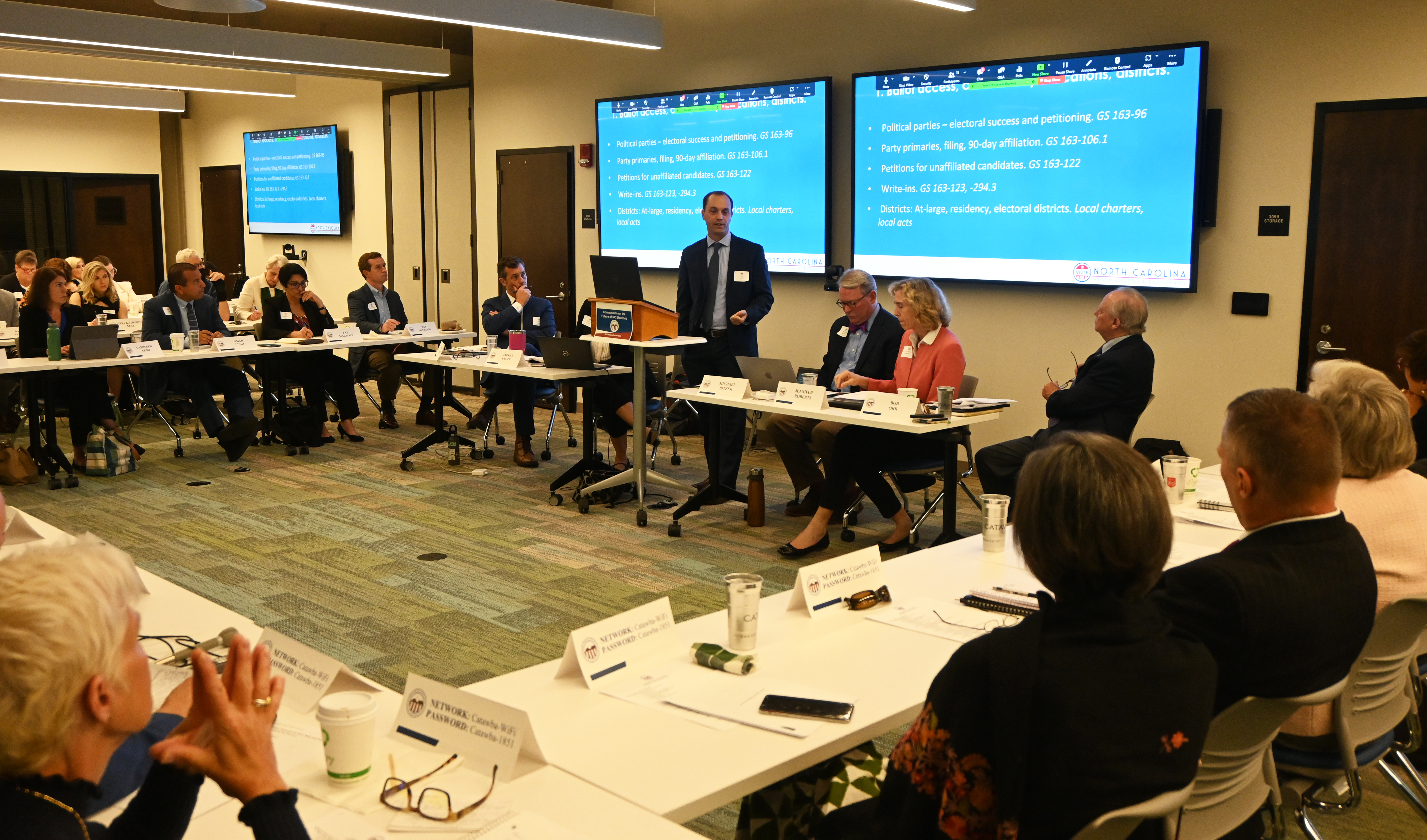The Commission on the Future of NC Elections holds meeting at Catawba College
Published 12:04 am Thursday, October 12, 2023

- General Counsel with the NC State Board of Elections Paul Cox speaks to the Commission on the Future of NC Elections about the election process. Brad Dountz/Salisbury Post.
SALISBURY — In less than a month, Election Day will arrive, allowing all register voters in North Carolina an opportunity to cast their vote in a multitude of races at the local and state level. Recently, the political discourse of whether or not elections are being legitimately run has caused a lack of faith in what is considered a cornerstone in a democratic government.
On Oct. 9, the Commission on the Future of NC Elections teamed up with the Carter Center and the NC Network for Fair, Safe & Secure Elections to host a meeting at Catawba College’s Center for the Environment to answer and clarify what goes on behind the scenes during elections and what laws are in place to protect them.
The commission is made up of former politicians, members of the N.C. Supreme Court, former mayors, and regular citizens, that Catawba College Professor of Politics and History and Steering Committee member Michael Bitzer says, “Reflect the nature of North Carolina’s population.”
“This is a really a cross partisan group of individuals across North Carolina who are coming to look into, try and better understand the process of running elections in the state. We know that confidence has taken a hit, trust in government in particularly is at historic lows, and people are wondering, ‘Are my votes safe?’ ‘Are they secure?’ ‘Are the results fair?’ I think that this working group of about 60 individuals is really focused on answering those kinds of questions,” Bitzer said.
The day began with Associate Directors with the Carter Center Avery Davis-Roberts and Nathan Stock speaking to the room on election monitoring. President of Catawba College David Nelson also gave a presentation to the commission.
General Counsel with the N.C. State Board of Elections Paul Cox went over how elections are managed and what the rules and regulations are for them. Cox says he and the board of elections have needed to develop “methods to address that lack of confidence” by letting people know how elections work and inform the public on these matters.
“It used to be elections were pretty boring. People didn’t focus on what you were doing because they trusted you did the right way. The last few years there’s been a lot more political rhetoric about elections and whether they should be trusted and that puts a lot of pressure on the people running elections and it leads to folks questioning their integrity and questioning whether they’re doing things the right way,” Cox said.
Some of the most asked questions Cox gets is how the voting machines are certified and how they’re used on the day of election. Absentee voting validity is another topic that is regularly raised.
“We have to make sure folks are educated about all of the the processes in place that guarantee that the voter who requests is eligible and they’re the ones who cast their ballot,” Cox said.
During the meeting, Cox started with how the laws that are written in the U.S. Constitution become enacted through states and the counties. He then expounded on elections in an all-encompassing speech that touched upon several subjects. Cox covered ballot access, write-in voting, registration, required personal information, logistics of voting, early voting, challenging results, confirmation, funding and security. The sobering demonstration painted an accurate picture of what it takes to pull off an election.
For the upcoming election, Cox emphasized that having proper identification is paramount when going to the polls. He advised a registered voter can still have other forms of ID if it has a picture of them on it. If a person does not have an ID, they can go to their county board of elections and receive one for free if they are registered. If someone arrives to the polls without an ID, but is registered, there is an “acception process” where they can still vote.
“The biggest thing for folks to bare in mind that you will now need to make sure you have your driver’s license. If you don’t have your driver’s license, make sure you have a student ID,” Cox said. “Whether you have an ID or not and you go to vote, you will be able to vote, but that is going to be process that’s going to be new for a lot of voters.”
John Blackburn, the husband of a commission member, came to the meeting because he’s interested in voting and believes what was discussed was highly informative. For anyone still skeptical on how elections are run, Blackburn suggests doing their own research before drawing any conclusions.
“I would encourage them to get more information from the people who actually work in elections about what the checks and balances are and how you make sure that problems are kept to a minimum. When claims are made about elections, how you can judge for yourself if something is likely to be true or not,” Blackburn said.


